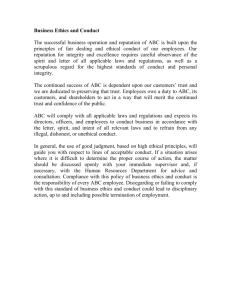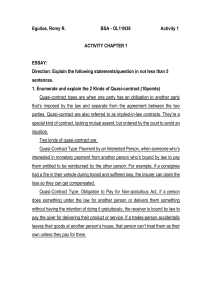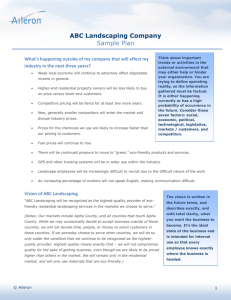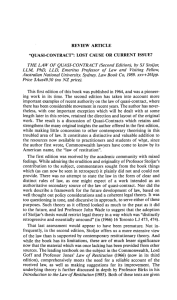BUSINESS LAW I NOTES - my seminole state college class notes
advertisement
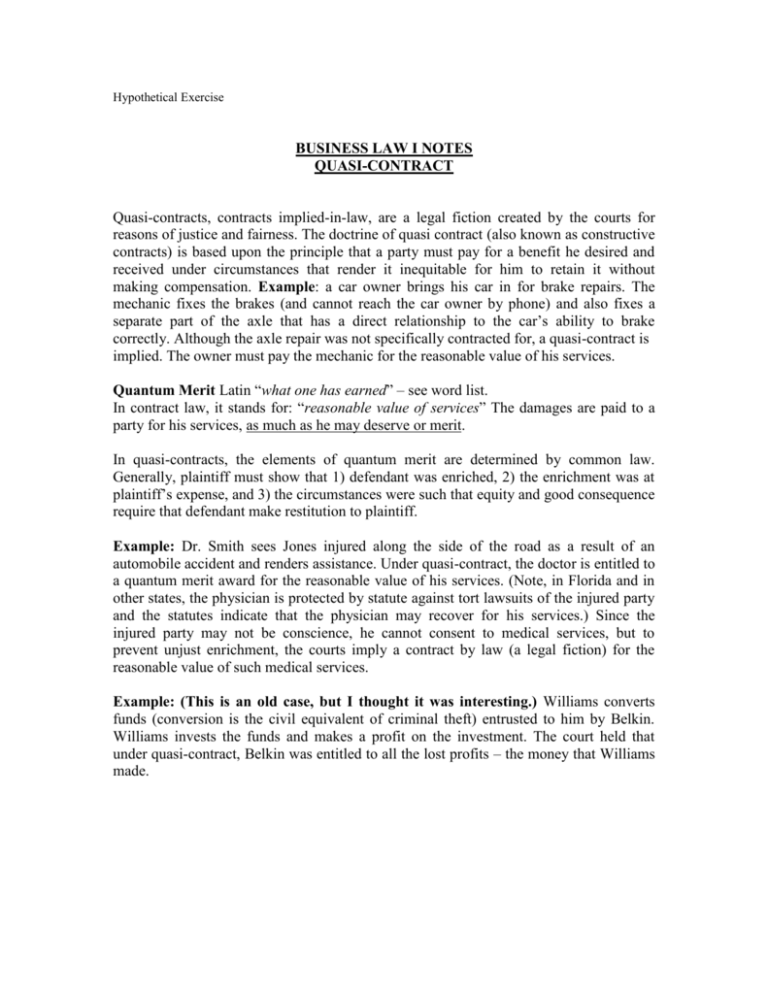
Hypothetical Exercise BUSINESS LAW I NOTES QUASI-CONTRACT Quasi-contracts, contracts implied-in-law, are a legal fiction created by the courts for reasons of justice and fairness. The doctrine of quasi contract (also known as constructive contracts) is based upon the principle that a party must pay for a benefit he desired and received under circumstances that render it inequitable for him to retain it without making compensation. Example: a car owner brings his car in for brake repairs. The mechanic fixes the brakes (and cannot reach the car owner by phone) and also fixes a separate part of the axle that has a direct relationship to the car’s ability to brake correctly. Although the axle repair was not specifically contracted for, a quasi-contract is implied. The owner must pay the mechanic for the reasonable value of his services. Quantum Merit Latin “what one has earned” – see word list. In contract law, it stands for: “reasonable value of services” The damages are paid to a party for his services, as much as he may deserve or merit. In quasi-contracts, the elements of quantum merit are determined by common law. Generally, plaintiff must show that 1) defendant was enriched, 2) the enrichment was at plaintiff’s expense, and 3) the circumstances were such that equity and good consequence require that defendant make restitution to plaintiff. Example: Dr. Smith sees Jones injured along the side of the road as a result of an automobile accident and renders assistance. Under quasi-contract, the doctor is entitled to a quantum merit award for the reasonable value of his services. (Note, in Florida and in other states, the physician is protected by statute against tort lawsuits of the injured party and the statutes indicate that the physician may recover for his services.) Since the injured party may not be conscience, he cannot consent to medical services, but to prevent unjust enrichment, the courts imply a contract by law (a legal fiction) for the reasonable value of such medical services. Example: (This is an old case, but I thought it was interesting.) Williams converts funds (conversion is the civil equivalent of criminal theft) entrusted to him by Belkin. Williams invests the funds and makes a profit on the investment. The court held that under quasi-contract, Belkin was entitled to all the lost profits – the money that Williams made. Fact Pattern: Party “P” bought a house from ABC Homes, Inc. After the house was constructed, P contracted with “C” nursery to put in landscaping. Before P executed (signed) the final contract with ABC, he passed away, but the landscaping had already been completed while the home was under construction. (A representative of ABC was aware of the new landscaping.) Because P had died, ABC voided their contract and sold the house to G. When the landscaping bill was not paid, C sued ABC for the landscaping and was awarded a judgment for $500. Defendant ABC appealed. These facts are undisputed. Assume further that ABC did not know that P had failed to pay C. Issue: Is ABC liable to plaintiff, C for the reasonable value of the landscaping under the theory of quasi-contract? Held: The key to quasi-contract is enrich and unjusty benefit – defendant being unjustly enriched. Here there appears no question that ABC sold the new home at a higher price since the landscaping was completed. However, plaintiff never contracted with C nor did plaintiff expect to be compensated by defendant. Plaintiff expected P to pay for the landscaping services, not ABC. Here a remedy exits. Plaintiff may file a lawsuit against the estate of P.




